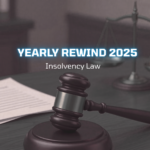NCLT clarifies: Interim moratorium not applicable to future liabilities

Introduction
In India, prior to the Insolvency and Bankruptcy Code, 2016 (Code), insolvency proceedings against individuals used to be governed by the Presidency Towns Insolvency Act, 1909 and the Provincial Insolvency Act, 1920. While, the Presidency Towns Insolvency Act, 1909 was applicable to the erstwhile presidency towns such as Calcutta, Bombay and Madras, the Provincial Insolvency Act, 1920 was applicable to the rest of India. On 15 November 2019, the Government of India notified Part III of the Insolvency and Bankruptcy Code 2016 (Code) in the official gazette, which allows creditors to initiate insolvency proceedings against personal guarantors. By virtue of a non-obstante clause, the Code has an overriding effect over the erstwhile contradictory insolvency legislations. The 15 November 2019 notification paved the way for creditors to file insolvency procedures against the personal guarantors of corporate debtors. Simultaneous proceedings against personal guarantors and corporate debtors can be initiated as a result of this notification (our views on the same can be accessed here).
As per the Code, a personal guarantor is an individual who is the surety in a contract of guarantee to a corporate debtor. The Code stipulates that an interim moratorium kicks in as soon as an application is filed against a personal guarantor for initiating insolvency. The effect of such interim moratorium is that all pending legal proceedings with respect to any ‘debt’ are deemed to have been stayed. As the provisions for a moratorium and interim moratorium under the Code are currently worded to apply in relation to all the ‘debts’ and not just in respect of the ‘debtor’, the scope of interim moratorium remains a grey area. In Ashok Mahindru & Anr. v. Vivek Parti, the National Company Law Appellate Tribunal (NCLAT) has thrown light on the ambit of ‘interim moratorium’.
Facts
In the aforementioned case, corporate insolvency resolution process (CIRP) was initiated against Advance Home and Personal Care Ltd. (Corporate Debtor) in September 2019. A resolution professional was appointed to manage the insolvency process superseding the board of directors of the Corporate Debtor. As the suspended directors refused to cooperate with the resolution professional, an application was filed against them in the National Company Law Tribunal (NCLT) in December 2019. Subsequently, the resolution professional also filed additional applications against them for fraudulent trading in July 2020. Both these applications were pending adjudication before the NCLT.
As the suspended directors had also provided personal guarantee for other companies, creditors filed an application before NCLT in December 2021 seeking initiation of insolvency resolution process of these suspended directors. As the interim moratorium had automatically kicked in from December 2021, the suspended directors filed an application before the NCLT arguing that the applications filed by the resolution professional against them stands suspended. The order of the NCLT rejecting the suspended directors’ application was challenged before the NCLAT.
NCLAT’s ruling
It was the case of the suspended directors that an adverse order against them in the applications filed by the resolution professional would result in the suspended directors paying penalties. Therefore, adjudication of such applications may result in a monetary obligation against them, and this would fall within the scope of “legal action or proceeding pending in respect of any debt”. Therefore, the proceedings must be stayed.
The NCLAT noted that under the Code, ‘debt’ is defined as “a liability or obligation in respect of a claim which is due from any person and includes a financial debt and operational debt”. Relying upon the definition of debt and purpose of the interim moratorium, the NCLAT ruled that the interim moratorium contemplates to stay proceedings relating to a debt which is due as on the date the interim moratorium kicks in. As in the present case, there was no debt due on the date of the filing of the application, the NCLT held that interim moratorium cannot stay proceedings which may give rise to future obligation or liabilities, and therefore the proceedings in the applications filed by the resolution professional cannot be stayed by operation of the interim moratorium. The NCLAT reiterated that the provisions of any act must be read harmoniously to make the enactment effective and workable, and accepting the arguments of the suspended director would render the Code redundant. Accordingly, the NCLAT dismissed the appeal of the suspended directors and upheld the NCLT’s order.
Our thoughts
The concept of ‘interim moratorium’ under the Code is influenced from jurisdictions such as the United Kingdom and the United States of America which have similar provisions for application of a moratorium from the filing of the application itself in the Corporate Insolvency and Governance Act, 2020 and Chapter 11 of the United States Bankruptcy Code, respectively. The 2015 interim report of the Bankruptcy Law Reform Committee (BLRC Interim Report) which served as a guidance for designing the Code, had reasoned that an interim moratorium is needed as there were concerns that the creditors of the corporate debtor may race to enforce their debts in the period leading up to the commencement of the insolvency process, which may undermine a collective and value maximizing insolvency resolution.
As the provisions for interim moratorium apply in relation to all the ‘debts’ and not just in respect of the ‘debtor’, it has been argued by some guarantors that interim moratorium will have very wide application and will apply to even third parties that bear any relation to such debt or to any legal proceedings that may give rise to future liability. The NCLAT disagreed with the arguments of the suspended directors and found it contrary to the intention of the interim moratorium provisions under the Code, which were not meant to scuttle the CIRP process against a corporate debtor. We are of the view that staying the applications filed by the resolution professional would have an adverse impact on the CIRP and would be tantamount to using one provision of the Code to defeat another. The NCLAT has harmoniously interpretated the provisions of the moratorium with the intention of the Code to make the legislation effective and workable. The present judgement is a step in the right direction as it clarifies the scope of the interim moratorium and ensures that debtors do not misuse the protection given by the Code by destroying or disposing off the assets of corporate debtor, so as to keep them out of the reach of creditors.
Author: Souvik Ganguly
The information contained in this document is not legal advice or legal opinion. The contents recorded in the said document are for informational purposes only and should not be used for commercial purposes. Acuity Law LLP disclaims all liability to any person for any loss or damage caused by errors or omissions, whether arising from negligence, accident, or any other cause.



